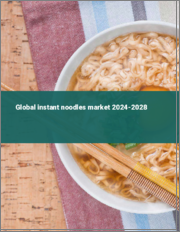
|
시장보고서
상품코드
1661120
즉석면 시장 보고서 : 유형별, 유통 채널별, 지역별(2025-2033년)Instant Noodles Market Report by Type (Fried, Non-fried), Distribution Channel (Supermarkets/Hypermarkets, Specialty Stores, Convenience Stores, Online Stores, and Others), and Region 2025-2033 |
||||||
IMARC Group은 2024년 즉석면 시장 세계 시장 규모가 579억 달러에 이르렀고, 2025-2033년간 4.2%의 연평균 성장률(CAGR)로 성장하여 2033년에는 840억 달러에 달할 것으로 예측했습니다. 집을 떠나 고등교육을 받는 학생들 증가, 새로운 장소를 탐험하고 모험적인 활동을 즐기는 것에 대한 개인의 관심 증가, 요리 용도의 인스턴트 국수 유연성 등이 시장을 주도하는 주요 요인 중 일부입니다.
즉석면은 이미 조리된 건면 블록에 향신료 분말과 조미유를 첨가한 제품입니다. 물을 끓인 후, 물에 담갔다가 전자레인지에 가열하여 빠르게 조리할 수 있도록 설계되어 있습니다. 유통기한이 길고, 다양한 재료와 결합하여 풍미와 영양을 높일 수 있습니다. 가성비가 뛰어나며, 다양한 취향에 맞추어 다양한 맛과 스타일이 준비되어 있습니다. 장기 보관이 가능하여 여행 시 비상식량 키트로도 적합합니다. 이 외에도 요리사나 가정 요리사들은 즉석면을 더 정교한 요리의 기초로 사용하며, 풍미를 높이기 위해 재료와 조미료를 추가하기도 합니다.
특히 도심이나 해외에서 집을 떠나 고등교육을 받는 학생들의 수가 증가함에 따라 편리하고 예산에 맞는 식사에 대한 수요가 증가하고 있습니다. 또한 트레킹, 등산, 번지점프, 암벽등반과 같은 모험 활동 참여자가 증가하면서 즉석면과 같이 휴대가 간편하고 조리하기 쉬운 식품에 대한 수요가 증가하고 있습니다. 이와는 별도로, 온라인 쇼핑 플랫폼의 부상은 소비자가 집에 있으면서 구매할 수 있는 편리함을 제공합니다. 또한, 몇몇 주요 기업들은 글루텐 프리, 비건, 유기농 즉석면과 같은 틈새 제품들을 출시하여 다양한 소비자층을 끌어들이고 있습니다.
즉석면 시장 동향/촉진요인:
급속한 도시화와 빠르게 변화하는 라이프스타일
세계의 급속한 도시화와 개인 소득 수준의 향상은 인스턴트 국수 수요를 자극하는 중요한 요인 중 하나입니다. 또한, 노동시간 연장, 잦은 여행, 개인 업무 증가 등으로 특징지어지는 현대인의 라이프스타일의 빠른 속도는 빠른 식사 솔루션의 필요성을 증가시키고 있습니다. 또한 인스턴트 국수 패키지는 종종 1 인분으로 소분되어있어 식사 계획을 세우거나 소분 할 필요가 없기 때문에 시장 전망이 좋습니다. 이 외에도 즉석면은 조리가 간단하고 준비에 걸리는 시간도 최소화할 수 있습니다. 그 결과, 즉석면은 이동 중 소비에 이상적이며 바쁜 직장인, 학생, 여행자 수요를 충족시킵니다.
저렴한 가격과 경제적 요인
즉석면은 가성비가 뛰어나기 때문에 전 세계 많은 소비자들이 선호하고 있습니다. 즉석면은 대량 생산과 효율적인 유통 시스템을 통해 생산되기 때문에 규모의 경제를 실현할 수 있습니다. 이러한 효율성은 경쟁력 있는 가격 설정으로 이어져 다양한 계층의 사람들이 이 식품을 이용할 수 있게 합니다. 또한, 즉석면 시장의 세계 특성은 경제 상황이 변동하는 지역에서도 제조업체가 균형 잡힌 지속적인 수요를 달성할 수 있도록 보장합니다. 이와는 별도로 1인분부터 대량 포장까지 다양한 포장 크기에 따라 가격대도 다양해져 개인 소비자부터 대가족에 이르기까지 다양한 수요를 충족시킬 수 있습니다.
문화 수용과 요리 혁신
즉석면은 전 세계의 많은 문화에 녹아들어가고 있으며, 이에 따라 지역적 취향에 맞는 다양한 맛과 조리법이 생겨나고 있습니다. 또한, 많은 대형 제조업체들이 현지에서 조달한 재료와 맛을 사용하여 해당 지역의 취향에 맞게 제품을 지속적으로 혁신하고 적응시키고 있습니다. 또한, 즉석면은 조리 용도의 유연성으로 인해 가정 요리에 창의성을 부여하고 야채, 단백질, 소스 등 다양한 첨가물을 추가하여 강화할 수 있습니다. 또한, 식품 가공 산업의 확대와 호텔, 레스토랑, 패스트푸드 체인의 확장은 시장 성장에 기여하고 있습니다.
목차
제1장 서문
제2장 조사 범위와 조사 방법
- 조사 목적
- 이해관계자
- 데이터 소스
- 1차 정보
- 2차 정보
- 시장 추정
- 보텀업 접근
- 톱다운 접근
- 조사 방법
제3장 주요 요약
제4장 서론
- 개요
- 주요 업계 동향
제5장 세계의 즉석면 시장
- 시장 개요
- 시장 실적
- 수량 동향
- 매출 동향
- COVID-19의 영향
- 가격 분석
- 주요 가격 지표
- 가격 구조
- 가격 동향
- 시장 분석 : 유형별
- 시장 분석 : 유통 채널별
- 시장 분석 : 지역별
- 시장 예측
- SWOT 분석
- 개요
- 강점
- 약점
- 기회
- 위협
- 밸류체인 분석
- 원재료 조달
- 제조업체
- 마케팅과 유통
- 수출업체
- 소매업체
- 최종 소비자
- Porter의 Five Forces 분석
- 개요
- 바이어의 교섭력
- 공급 기업의 교섭력
- 경쟁 정도
- 신규 진출업체의 위협
- 대체품의 위협
- 주요 시장 성장 촉진요인·과제
- 제조업체 성공 요인
제6장 시장 분석 : 유형별
- 유탕면
- 시장 동향
- 시장 예측
- 비유탕면
- 시장 동향
- 시장 예측
제7장 시장 분석 : 유통 채널별
- 슈퍼마켓/하이퍼마켓
- 시장 동향
- 시장 예측
- 전문점
- 시장 동향
- 시장 예측
- 편의점
- 시장 동향
- 시장 예측
- 온라인 스토어
- 시장 동향
- 시장 예측
- 기타
- 시장 동향
- 시장 예측
제8장 시장 분석 : 지역별
- 중국
- 시장 동향
- 시장 예측
- 인도네시아
- 시장 동향
- 시장 예측
- 일본
- 시장 동향
- 시장 예측
- 인도
- 시장 동향
- 시장 예측
- 베트남
- 시장 동향
- 시장 예측
- 미국
- 시장 동향
- 시장 예측
- 대한민국
- 시장 동향
- 시장 예측
- 태국
- 시장 동향
- 시장 예측
- 사우디아라비아
- 시장 동향
- 시장 예측
- 기타
- 시장 동향
- 시장 예측
제9장 경쟁 구도
- 시장 구조
- 주요 기업
제10장 즉석면 제조 공정
- 제품 개요
- 세부 프로세스 플로우
- 다양한 유형의 단위 작업
- 물질 수지와 원재료 요건
제11장 프로젝트 상세, 필요조건 및 비용
- 토지 요건과 비용
- 건설 요건과 비용
- 기계 개요 그림
- 공장 기계
- 기계 사진
- 원재료 요건과 지출
- 원재료와 최종 제품 사진
- 포장 요건과 지출
- 운송 요건과 지출
- 유틸리티 요건과 지출
- 인원 요건과 지출
- 기타 설비 투자
제12장 융자와 자금 원조
제13장 프로젝트의 경제성
- 프로젝트의 자본비용
- 기술 경제적 파라미터
- 공급망 단계별 제품 가격과 마진
- 과세 및 감가상각
- 수입 예측
- 지출 예측
- 재무 분석
- 이익 분석
제14장 주요 기업 개요
- Master Kong(Shenyang) Instant Noodle Foodstuff Co., Ltd.
- Hebei Hualong Food Group
- Indofood Sukses Makmur
- Nissin Food Products Co., Ltd.
- Nestle S.A.
- Acecook Vietnam Joint Stock Company
The global instant noodles market size reached USD 57.9 Billion in 2024. Looking forward, IMARC Group expects the market to reach USD 84.0 Billion by 2033, exhibiting a growth rate (CAGR) of 4.2% during 2025-2033. The increasing number of students pursuing higher education away from home, rising interest of individuals in exploring new places and enjoying adventurous activities, and the flexibility of instant noodles in culinary applications are some of the major factors propelling the market.
Instant noodles are pre-cooked and dried noodle blocks accompanied by flavoring powder and seasoning oil. They are designed to be quickly prepared by boiling water, soaking, and microwaving. They have a longer shelf life and can be combined with various ingredients to enhance flavor and nutrition. They are cost-effective and available in a multitude of flavors and styles catering to diverse tastes. They can be stored for extended periods, which makes them suitable for emergency food kits during traveling. Besides this, chefs and home cooks use instant noodles as a base for more elaborate dishes and add ingredients and seasonings to enhance the flavor.
The increasing number of students pursuing higher education away from home, especially in urban centers and abroad, is catalyzing the demand for convenient and budget-friendly meals. Additionally, the rising participation of individuals in adventure activities like trekking, mountain climbing, bungee jumping, and rock climbing is driving the need for portable and easy-to-prepare foods like instant noodles. Apart from this, the rise of online shopping platforms is offering consumers the convenience of purchasing from the comfort of their homes. Furthermore, several leading companies are introducing niche product variants, such as gluten-free, vegan, or organic instant noodles to attract a wider consumer base.
Instant Noodles Market Trends/Drivers:
Rapid urbanization and fast-paced lifestyle
Rapid urbanization and the global increase in the income level of individuals represent one of the key factors catalyzing the demand for instant noodles. Additionally, the fast-paced nature of contemporary lifestyles, characterized by longer working hours, frequent travel, and increased personal commitments, is driving the need for quick meal solutions. Furthermore, the packaging of instant noodles, often portioned for single servings, eliminates the need for meal planning or portioning, which is offering a favorable market outlook. Apart from this, instant noodles allow ease of preparation and require minimal preparation time. As a result, they are ideal for on-the-go consumption, meeting the demands of busy professionals, students, and travelers.
Affordability and economic factors
The cost-effectiveness of instant noodles is undeniable, which makes them a preferred choice for many consumers worldwide. Their production involves mass manufacturing and efficient distribution systems, which allows for significant economies of scale. This efficiency translates to competitive pricing, enabling a broad segment of the population to access this food option. Moreover, the global nature of the instant noodle market ensures that the regions with fluctuating economic conditions, manufacturers can achieve a balanced and sustained demand. Apart from this, versatility in packaging sizes, from single servings to bulk packs, also offers varied price points, which is catering to individual consumers and larger households.
Cultural acceptance and culinary innovation
Instant noodles are becoming ingrained in many cultures around the world, which is leading to a wide variety of flavors and preparations that cater to local tastes. Additionally, numerous leading manufacturers are continuously innovating and adapting their products to meet regional preferences, using locally sourced ingredients and flavors. Furthermore, the flexibility of instant noodles in culinary applications allows for creativity in home cooking, where they can be enhanced with various additions like vegetables, proteins, and sauces. Moreover, the expansion of the food processing industry and the expansion of hotels, restaurants, and fast-food chains is contributing to market growth.
Instant Noodles Industry Segmentation:
Breakup by Type:
- Fried
- Non-fried
Fried dominates the market
Breakup by Distribution Channel:
- Supermarkets/Hypermarkets
- Specialty Stores
- Convenience Stores
- Online Stores
- Others
Supermarkets/hypermarkets hold the largest market share
Breakup by Region:
- China
- Indonesia
- Japan
- India
- Vietnam
- United States
- Republic of Korea
- Thailand
- Saudi Arabia
- Others
China exhibits a clear dominance, accounting for the largest instant noodles market share
The report has also provided a comprehensive analysis of all the major regional markets, which include According to the report, China, Indonesia, Japan, India, Vietnam, Unites States, Republic of Korea, Thailand, Saudi Arabia, Others. According to the report, China accounted for the largest market share.
Noodles have deep historical and cultural significance in China. They are ingrained in the culinary traditions of the country, making the acceptance of instant variations a natural transition. The familiarity and emotional connection with noodle-based dishes enhance the popularity of instant noodles. Apart from this, rapid urbanization in China is leading to a shift in lifestyles. Many urban dwellers are facing time constraints due to demanding jobs and commutes, which is driving the demand for quick-meal options like instant noodles. Furthermore, China is a home to a robust and efficient distribution network that ensures instant noodles are readily available even in the most remote areas.
Competitive Landscape:
Companies are actively adapting to the ever-evolving consumer landscape. They are continuously researching and developing new flavors to cater to the diverse tastes of global consumers. Additionally, many manufacturers are also emphasizing sustainability, seeking environment-friendly packaging options, and reducing their carbon footprints. They are collaborating with suppliers to ensure ethical sourcing of ingredients, focusing particularly on local produce to guarantee freshness and authenticity. Furthermore, these enterprises are increasingly investing in marketing campaigns, utilizing both traditional media and digital platforms. They are engaging influencers and launching interactive campaigns on social media to connect with the younger demographic and foster brand loyalty. They are also expanding their production capacities and optimizing distribution networks, ensuring that their products are readily available across diverse retail channels, including supermarkets and online stores.
The report has provided a comprehensive analysis of the competitive landscape in the market. Detailed profiles of all major companies have also been provided. Some of the key players in the market include:
- Master Kong (Shenyang) Instant Noodle Foodstuff Co., Ltd.
- Hebei Hualong Food Group
- Indofood Sukses Makmur
- Nissin Food Products Co., Ltd.
- Nestle S.A.
- Acecook Vietnam Joint Stock Company
Key Questions Answered in This Report
- 1.What was the size of the global instant noodles market in 2024?
- 2.What is the expected growth rate of the global instant noodles market during 2025-2033?
- 3.What are the key factors driving the global instant noodles market?
- 4.What has been the impact of COVID-19 on the global instant noodles market?
- 5.What is the breakup of the global instant noodles market based on the type?
- 6.What is the breakup of the global instant noodles market based on the distribution channel?
- 7.What are the key regions in the global instant noodles market?
- 8.Who are the key players/companies in the global instant noodles market?
Table of Contents
1 Preface
2 Scope and Methodology
- 2.1 Objectives of the Study
- 2.2 Stakeholders
- 2.3 Data Sources
- 2.3.1 Primary Sources
- 2.3.2 Secondary Sources
- 2.4 Market Estimation
- 2.4.1 Bottom-Up Approach
- 2.4.2 Top-Down Approach
- 2.5 Forecasting Methodology
3 Executive Summary
4 Introduction
- 4.1 Overview
- 4.2 Key Industry Trends
5 Global Instant Noodles Market
- 5.1 Market Overview
- 5.2 Market Performance
- 5.2.1 Volume Trends
- 5.2.2 Value Trends
- 5.3 Impact of COVID-19
- 5.4 Price Analysis
- 5.4.1 Key Price Indicators
- 5.4.2 Price Structure
- 5.4.3 Price Trends
- 5.5 Market Breakup by Type
- 5.6 Market Breakup by Distribution Channel
- 5.7 Market Breakup by Region
- 5.8 Market Forecast
- 5.9 SWOT Analysis
- 5.9.1 Overview
- 5.9.2 Strengths
- 5.9.3 Weaknesses
- 5.9.4 Opportunities
- 5.9.5 Threats
- 5.10 Value Chain Analysis
- 5.10.1 Raw Material Procurement
- 5.10.2 Manufacturer
- 5.10.3 Marketing & Distribution
- 5.10.4 Exporter
- 5.10.5 Retailer
- 5.10.6 End-Consumer
- 5.11 Porter's Five Forces Analysis
- 5.11.1 Overview
- 5.11.2 Bargaining Power of Buyers
- 5.11.3 Bargaining Power of Suppliers
- 5.11.4 Degree of Competition
- 5.11.5 Threat of New Entrants
- 5.11.6 Threat of Substitutes
- 5.12 Key Market Drivers and Challenges
- 5.13 Success Factors for Manufacturers
6 Market Breakup by Type
- 6.1 Fried
- 6.1.1 Market Trends
- 6.1.2 Market Forecast
- 6.2 Non-fried
- 6.2.1 Market Trends
- 6.2.2 Market Forecast
7 Market Breakup by Distribution Channel
- 7.1 Supermarkets/Hypermarkets
- 7.1.1 Market Trends
- 7.1.2 Market Forecast
- 7.2 Specialty Stores
- 7.2.1 Market Trends
- 7.2.2 Market Forecast
- 7.3 Convenience Stores
- 7.3.1 Market Trends
- 7.3.2 Market Forecast
- 7.4 Online Stores
- 7.4.1 Market Trends
- 7.4.2 Market Forecast
- 7.5 Others
- 7.5.1 Market Trends
- 7.5.2 Market Forecast
8 Market Breakup by Region
- 8.1 China
- 8.1.1 Market Trends
- 8.1.2 Market Forecast
- 8.2 Indonesia
- 8.2.1 Market Trends
- 8.2.2 Market Forecast
- 8.3 Japan
- 8.3.1 Market Trends
- 8.3.2 Market Forecast
- 8.4 India
- 8.4.1 Market Trends
- 8.4.2 Market Forecast
- 8.5 Vietnam
- 8.5.1 Market Trends
- 8.5.2 Market Forecast
- 8.6 United States
- 8.6.1 Market Trends
- 8.6.2 Market Forecast
- 8.7 Republic of Korea
- 8.7.1 Market Trends
- 8.7.2 Market Forecast
- 8.8 Thailand
- 8.8.1 Market Trends
- 8.8.2 Market Forecast
- 8.9 Saudi Arabia
- 8.9.1 Market Trends
- 8.9.2 Market Forecast
- 8.10 Others
- 8.10.1 Market Trends
- 8.10.2 Market Forecast
9 Competitive Landscape
- 9.1 Market Structure
- 9.2 Key Players
10 Instant Noodles Manufacturing Process
- 10.1 Product Overview
- 10.2 Detailed Process Flow
- 10.3 Various Types of Unit Operations Involved
- 10.4 Mass Balance and Raw Material Requirements
11 Project Details, Requirements and Costs Involved
- 11.1 Land Requirements and Expenditures
- 11.2 Construction Requirements and Expenditures
- 11.3 Machinery Schematic
- 11.4 Plant Machinery
- 11.5 Machinery Pictures
- 11.6 Raw Material Requirements and Expenditures
- 11.7 Raw Material and Final Product Pictures
- 11.8 Packaging Requirements and Expenditures
- 11.9 Transportation Requirements and Expenditures
- 11.10 Utility Requirements and Expenditures
- 11.11 Manpower Requirements and Expenditures
- 11.12 Other Capital Investments
12 Loans and Financial Assistance
13 Project Economics
- 13.1 Capital Cost of the Project
- 13.2 Techno-Economic Parameters
- 13.3 Product Pricing and Margins Across Various Levels of the Supply Chain
- 13.4 Taxation and Depreciation
- 13.5 Income Projections
- 13.6 Expenditure Projections
- 13.7 Financial Analysis
- 13.8 Profit Analysis
14 Key Player Profiles
- 14.1 Master Kong (Shenyang) Instant Noodle Foodstuff Co., Ltd.
- 14.2 Hebei Hualong Food Group
- 14.3 Indofood Sukses Makmur
- 14.4 Nissin Food Products Co., Ltd.
- 14.5 Nestle S.A.
- 14.6 Acecook Vietnam Joint Stock Company















